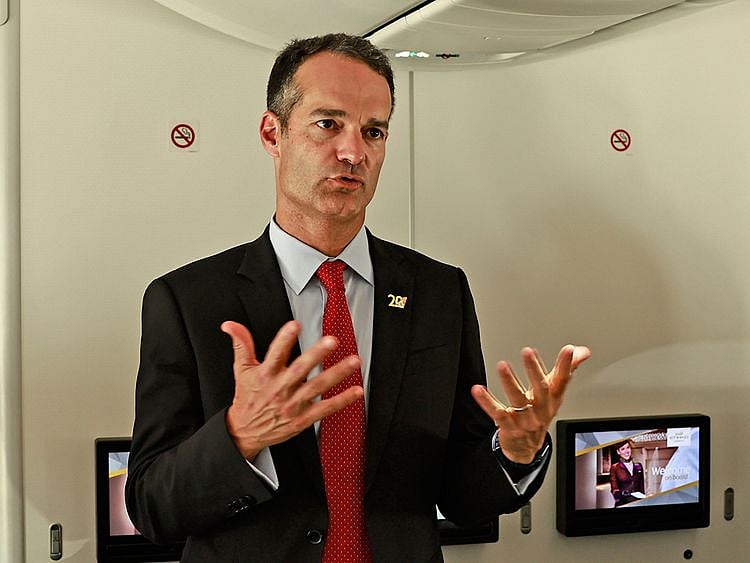Dubai Airshow 2023: 'Terminal A critical for Etihad Airways’ growth', says CEO
“Hope to carry 17 million passengers from new base in Abu Dhabi next year,” says CEO

Dubai: National carrier Etihad Airways’ future ‘sustainable’ growth strategy hinges heavily on Zayed International Airport’s new Terminal A, airline CEO Antonoaldo Neves said on the sidelines of the Dubai Airshow on Tuesday.
And this includes its ambitions to double its fleet size to 150 aircraft and carry 33 million passengers by 2030. Abu Dhabi’s main airport was renamed after Sheikh Zayed following Terminal A’s operational launch last month.
“Terminal A is extremely important for us because Etihad cannot grow if we don’t have the new terminal. In the next seven years, we are aiming for 30-33 million passengers,” he said.
According to the CEO, Etihad’s expansion to Terminal A promises enhanced customer experiences, increased efficiency, and reduced fuel consumption. The growth strategy also includes moving away from ultra-long-haul flights and focusing on medium to long-haul flights. “Terminal A will give us the capacity we need for better customer experience,” he added.
17m passengers in 2024
Neves, appointed airline CEO after Tony Douglas’ (current Riyadh Air CEO) departure last year, said he hopes to carry 17 million passengers from its new base in Abu Dhabi next year.
The airline operated its maiden commercial flight from Terminal A (Abu Dhabi to India) late last month.
The airline is celebrating its 20th anniversary this year. “Twenty years is an important mark for us. The first 15 years were all about setting very high aspirations; that’s how we started. And we have restructured ourselves in the few years since COVID,” said Neves.
However, the mandate from shareholders is very clear – deliver extraordinary customer service and make money, said Neves. “So we’re taking a very business-oriented approach toward growth. We have a seven-year plan, not a 10-year one, just because it ties together with our fleet plan,” he added.
Flexible fleet plans
This year, the airline incorporated 16 new planes and achieved a growth rate of 35 per cent, said Neves. “We are looking at a 20-25 per cent growth rate next year,” the CEO added. The airline also has no plans to announce new aircraft purchase deals during the Dubai Airshow. “This time, we chose to fly low profile and decided to deliver first,” he added.
That said, Neves did express concerns about supply chain constraints that may slow down future aircraft deliveries. And the CEO expects the issues to persist for two to three years.
“The biggest challenge we have is on the supply chain side. The supply of planes in the market is not great because of engine issues, fortunately not with our fleet. There are delays for the right parts and airline seats as well…. There is a lot of demand, but our ability as an industry to provide what we need is not there,” said Neves.
Geopolitics, a challenge?
Neves confirmed that the Israel–Hamas war has had minimal impact on the airline, especially when considering flights to Israel. “We had seven flights a week, and now it’s four, but our commitment to the market remains. But safety is our priority, and as long as it’s safe, we stand by our markets,” he added.
Sign up for the Daily Briefing
Get the latest news and updates straight to your inbox
Network Links
GN StoreDownload our app
© Al Nisr Publishing LLC 2025. All rights reserved.